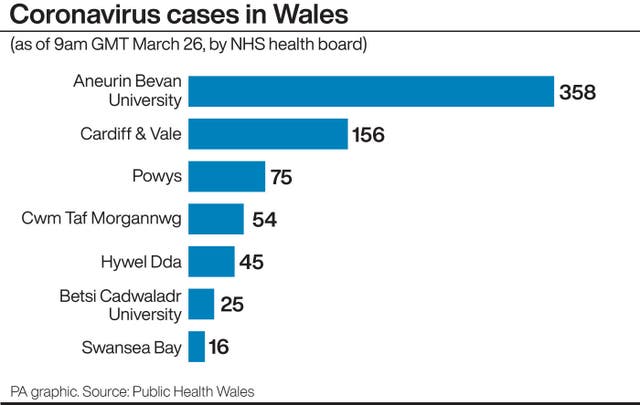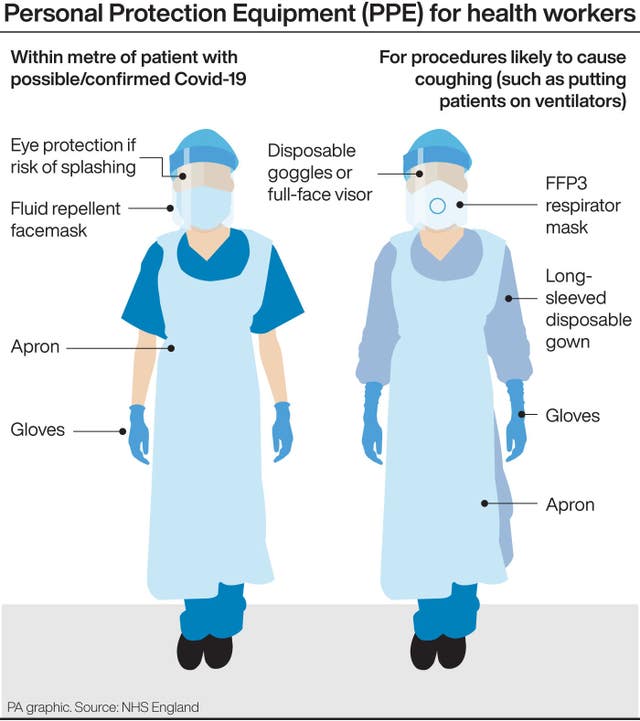
Six further people with coronavirus in Wales have died, taking the country’s total number of deaths to 28, Public Health Wales said.
There are now 741 confirmed cases of Covid-19 in Wales, an increase of 113 from Wednesday to Thursday.
Forty-nine of the new positive tests are in the Aneurin Bevan University Health Board area, which covers Blaenau Gwent, Caerphilly, Monmouthshire, Newport, Torfaen and South Powys.

The area now has 358 cases, more than any other individual health board area in Wales and almost half the total number.
On Wednesday, the health board warned it was seeing “the same pattern as was seen in Italy” and said “huge effort” was required to stop the NHS becoming overwhelmed.
Public Health Wales did not provide details of the areas in which people had died, their ages or whether they had underlying health conditions.
Dr Robin Howe, incident director for the novel coronavirus outbreak response at Public Health Wales, said: “One hundred and thirteen new cases have tested positive for novel coronavirus (Covid-19) in Wales, bringing the total number of confirmed cases to 741, although the true number of cases is likely to be higher.
“Novel coronavirus (Covid-19) is now circulating in every part of Wales.
“Six further deaths have been reported to us of people who had tested positive for novel coronavirus (Covid-19), taking the number of deaths in Wales to 28.
“We offer our condolences to the family and friends affected, and we ask those reporting on the situation to respect patient confidentiality.”
UPDATED STATEMENT:
There are 113 new cases have tested positive for Novel Coronavirus (COVID-19) in Wales, bringing the total number of confirmed cases to 741, although the true number of cases is likely to be higher.
Read more here: https://t.co/Z1N6KvyokQ pic.twitter.com/hxcRbS6uud
— Public Health Wales (@PublicHealthW) March 26, 2020
The new cases, by health board, are: 49 in Aneurin Bevan, three in Betsi Cadwaladr, 31 in Cardiff and Vale, 12 in Cwm Taf Morgannwg, seven in Hywel Dda, five in Powys and two in Swansea Bay.
There are three more to be confirmed and one further patient who is resident outside Wales.
Earlier on Thursday, Dr Frank Atherton, the chief medical officer for Wales, told a press conference in Cardiff that the higher numbers in Aneurin Bevan were due to increased testing.
“It is closer to England, we know that the hotspot in the UK is around London and so being on the border with England is an issue,” Dr Atherton said.
“There has been a lot more testing in Aneurin Bevan, in that health board, and so the fact we’ve been doing more testing has led to an increase in the number of cases identified.
“I think we always said that as the epidemic unfolds, there will be areas in Wales which flare up and then calm down a bit.
“It’s a complex issue and there are a number of reasons for that, but it’s largely about testing.”
🎥 Yn fyw nawr | 🎥 Live now: https://t.co/R83Kgvs5db
— Welsh Government (@WelshGovernment) March 26, 2020
Around 80% of people will contract Covid-19 at some point, with the current measures put in place to give the NHS time to get ready, he told the briefing.
“At some point, once the interventions that we’ve put in place here in Wales and in the UK are lifted, there is a risk that people will then start to become infected again,” Dr Atherton said.
“And so the way in which we release those measures will be very critical.
“What we’re doing at the moment is watching other countries which have put these quite repressive measures in place, to see what happens when they lift – how quickly can we lift those measures?
“These are all unanswered questions, but everybody is vulnerable because nobody has experienced this virus before – it’s a new virus to humanity.”
Dr Sarah Aitken, director of public health at Aneurin Bevan University Health Board, issued a stark warning in a video message posted online.

She said: “The pattern we are seeing in Gwent is the same pattern as was seen in Italy, where their healthcare system is now overwhelmed.
“Without a huge effort by all of us, we are heading for the moment in Gwent where our NHS will be overwhelmed, too.
“We won’t have enough hospital beds for everyone who needs lifesaving ventilators and intensive care.”
Andrew Goodall, chief executive of NHS Wales, described Dr Aitken’s message as “really important” and called on people to follow the advice on social distancing and staying at home.
“I think the intention there is to make sure that the public are very aware that the steps that have been outlined, and the actions to ask for social distancing, for people to stay in their homes, is genuinely followed by the population,” Dr Goodall said.
“Obviously, we have the international experience that we have to look at, and watching the experience through Italy and also through Spain in particular.
“I think that guides us to some of the actions that are going to be necessary here, but I think it was a really important message.”
He said the number of critical care beds in Wales had been expanded from 156 to 290.


Comments: Our rules
We want our comments to be a lively and valuable part of our community - a place where readers can debate and engage with the most important local issues. The ability to comment on our stories is a privilege, not a right, however, and that privilege may be withdrawn if it is abused or misused.
Please report any comments that break our rules.
Read the rules hereLast Updated:
Report this comment Cancel